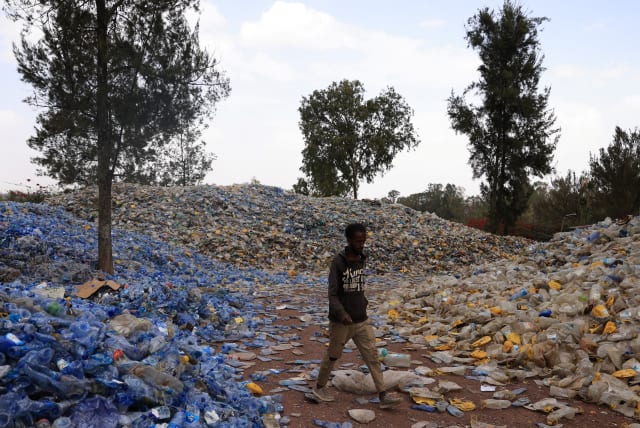Addis Ababa's warming may trigger year-round malaria, study warns

According to the report, the city’s extreme daily maximum temperature would increase by about 1.7° Celsius by 2060.
Ethiopian residents of Addis Ababa could be at risk of year-round malaria transmission if average daily temperatures continue to rise, an Ethiopian post-doctoral student living in the United States warned.
Between 7,500 and 30,000 Ethiopians who claim Jewish ancestry or have first-degree Jewish relatives continue to live in Ethiopia, according to various estimates, including by the World Jewish Congress. Most live in Addis Ababa or Gondar, which is about 650 kilometers away from the city.
Abay Yimere, a post-doctoral scholar in international environment and resource policy at Tufts University, worked with researchers at the Woodwell Climate Research Center in Massachusetts to analyze temperature data and flood risk from the past to help predict the future. Yimere wrote about their work in an open-source article. The research is still pending peer review.
'A rise in the frequency, duration, and intensity of heatwaves'
According to the report, the city’s extreme daily maximum temperature would increase by about 1.7° Celsius by 2060 and by 1.8° Celsius during the warm-season months of March, April and May, bringing peak temperatures in some southern city neighborhoods to 26.21° Celsius. The researcher said further increases would be expected by 2090, with highs hitting as much as 27.78° Celsius.
Climate change “would result in a rise in the frequency, duration, and intensity of heatwaves,” Yimere wrote. “In addition, higher temperatures contribute to increased water vapor and transpiration. This will threaten health, ecosystems, infrastructure, livelihoods, and food supplies.”
Moreover, the increased temperatures would lead to public health risks, namely malaria transmission.
Malaria is a grave and occasionally deadly illness triggered by a parasite that frequently invades a specific mosquito species that feeds on humans, according to the Centers for Disease Control and Prevention. Malaria patients often experience severe symptoms, including elevated body temperatures, uncontrollable shivering, and signs reminiscent of the flu.
A paper published earlier this year by a team of Ethiopian researchers in the Infection and Drug Resistance journal showed that 2.9 million confirmed malaria cases were reported in 2019 alone, and 4,782 people died. Malaria transmission, however, is currently seasonal in the country, they explained, with the most significant transmission peak from September to December and a smaller rise during April and May.
Can Ethiopia deal with rising population?
Some 5.4 million people live in Ethiopia today. According to the World Population Review, the population is expected to reach close to 9 million by 2035.
To save lives, Yimere explained, “there will have to be sustained policy measures to deal with the risk.”
In addition to the public health aspect, the researcher pointed out that 67% of the population in Addis Ababa lives in flood-prone areas. Climate change is expected to increase water-related challenges around the city’s three primary rivers, which could put people at risk.
Increased flooding could be especially problematic for the 70% of the population that lives in informal settlements, often on the banks of rivers.
A Population and Immigration Authority official told the Knesset in June that around 9,000 Ethiopian citizens waiting to make aliyah live under challenging conditions in transit camps and suffer from malnutrition.
Yimere offered several policy recommendations the government could follow to help temper the challenge. These include establishing a climate adaptation and resilience office, developing a water management strategy and investing in green infrastructure. In addition, he said the country should launch a public awareness campaign and school education programs to help residents be more aware of the impacts of climate change.
The Environment and Climate Change portal is produced in cooperation with the Goldman Sonnenfeldt School of Sustainability and Climate Change at Ben-Gurion University of the Negev. The Jerusalem Post maintains all editorial decisions related to the content.
Jerusalem Post Store
`; document.getElementById("linkPremium").innerHTML = cont; var divWithLink = document.getElementById("premium-link"); if (divWithLink !== null && divWithLink !== 'undefined') { divWithLink.style.border = "solid 1px #cb0f3e"; divWithLink.style.textAlign = "center"; divWithLink.style.marginBottom = "15px"; divWithLink.style.marginTop = "15px"; divWithLink.style.width = "100%"; divWithLink.style.backgroundColor = "#122952"; divWithLink.style.color = "#ffffff"; divWithLink.style.lineHeight = "1.5"; } } (function (v, i) { });
